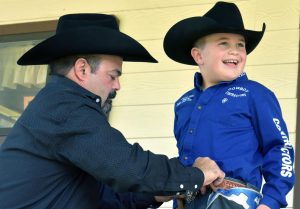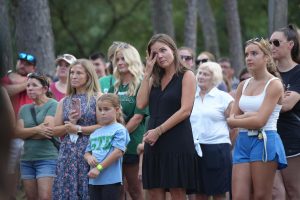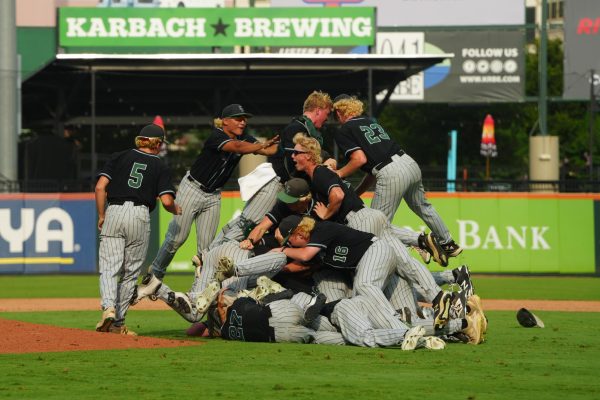Parents give back, instill pride in Central African roots
Freshman Kashikala Mundemba and seniors Katina and Lulenga Mundemba are first-generation Americans. Their parents are from the Democratic Republic of Congo.
October 21, 2021
People know senior Katina Mundemba as many things: a high-achieving honor student, a varsity-level cross country runner, and a member of both STUCO and NHS. What most don’t realize is that he and his siblings are first-generation Americans.
The Mundembas hail from the Democratic Republic of Congo, or the D.R.C. Mombwe Mundemba, father of Katina, was born there, and there he remained until he was 32, traveling to the United States to further his education. Although the D.R.C., like many Sub-Saharan African countries, is afflicted with mass poverty, there are more affluent, developed segments of the country, the result of Belgian colonization. Mombwe’s family lived in one of these parts of the country; and, according to him, the quality of education and life in general was similar to that of the United States.
“As a matter of fact, when I came for the first time to this part of the world, I saw Kingwood and it reminded me of some of the neighborhoods where I grew up,” Mombwe said.
Mombwe received a full education in the D.R.C., earning a master’s in electrical engineering before coming to the U.S. for a master’s in computer science. With these degrees he was able to secure a job as a software and automation engineer in Kingwood.
Muswe Mundemba, Mombwe’s wife, was also raised and schooled in the D.R.C. The pair actually went to the same university for a while; but much to the chagrine of Mombwe, Muswe can’t recall seeing him there.
“I met her, but she doesn’t remember meeting me,” Mombwe laughed. “So it’s a one-way street.”
They attended the same boarding school in the D.R.C. for a brief year before Mombwe graduated and moved to the U.S. to attend Loyola University Maryland. It was in Maryland where Mombwe and his future bride would begin their courtship.
Now, living in Kingwood, the Mundembas are a large family with six children, three of whom are currently attending Kingwood Park: Katina, his twin sister Lulenga, and their little sister Kashikala, who is a freshman.
Though the siblings were all raised in the same household, they have different perspectives on their family’s connection to the D.R.C. Kashikala, in particular, has embraced the culture, noting her fondness for her mother’s African songs and the traditional games that she has played with her cousins from the D.R.C.
“We had a family reunion once,” Kashikala said, “and getting involved in the culture was really, really fun.”
Katina has slightly less enthusiasm for the cultural traditions, but he does have a soft spot for the traditional food. One West African dish he recommends is fufu, a bread-like substance made from cassava, a starchy root vegetable.
“It’s kind of like Play-Doh, but it doesn’t taste as bad,” Katina said. “You basically use it to dip all your meats and your vegetables and sauces and whatnot.”
Lulenga, while a fan of the traditional African songs and games, is not on the fufu train.
“I stopped being able to eat those,” Lulenga said. “I used to eat it, but at some point I just could not.”
The Mundembas’ involvement in the D.R.C. didn’t end when they left Africa. Today, both Mombwe and Muswe have projects back in their motherland, which they frequently visit to supervise their ventures, such as starting a small farm to rent to local farmers and creating a school. These projects are supported by the Mundembas’ personal funds with the goal of improving the quality of life for those in the D.R.C.
“The plan,” Katina said, “is to improve the infrastructure, to help facilitate the economy, and empower those who live there.”














